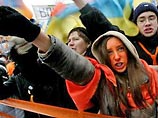Ukraine to split over election dispute
Regional authorities of Ukraine are ready to pronounce their territories autonomous

The Ukrainian parliament known as the Verkhovnaya Rada, or the Supreme Rada, has made a political decision: the parliament announced that the presidential election in Ukraine was null ad void. Three hundred and twenty-three deputies supported the decision, based on the draft law, which found the voting illegal. 
Only 75 of 433 deputies voted to find the presidential election unsuccessful. The majority of parliamentarians abstained from the voting. In addition, the Ukrainian parliament did not decide to hold an additional voting on December 12th. It also became known that the Supreme Rada decided to set out its vote of no confidence to the national Central Electoral Committee.
Several hours prior to the session, the speaker of the Ukrainian parliament, Vladimir Litvin, suggested three variants of solving the political crisis in the country: to hold a political reform, when the prime minister would take a part of president's functions, to hold a repeated voting, or let the Supreme Rada choose the president from the two candidates. According to the speaker, the Ukrainian presidential election is to be considered invalid. The speaker emphasized that the parliament had to claim political responsibility and evaluate the situation in the country, as well as the actions of the Central Electorate Committee.
Meanwhile, opposition leader Viktor Yushchenko stated at the meeting of his followers on Friday that the opposition's major condition for negotiations with Viktor Yanukovych was to cancel the results of the second stage of the election and hold a repeated voting. “The announced results of the second round do not comply with the will of the people and are to be cancelled,” said he.
The Ukrainian society is about to split. The authorities of Ukraine's eastern areas, the voters of which support Viktor Yanukovych, are threatening to pronounce their territories autonomous. It was offered to set up special executive agencies in the south-east of Ukraine, as well as separate tax and bank systems, in the event the opposition grasped the power.
Viktor Yushchenko's followers raised the orange-colored banner on the building of the Council of the Lvov region. The power in the Lvov region has been reportedly handed over to the opposition. The geographical split of the Ukrainian society has touched upon the national television too: the broadcasting of Yushchenko-supportive television channels has been ceased in the East of Ukraine.
Spokespeople for the Kiev police stated that they would stop the opposition's blocking of the government headquarters in Kiev. Ukraine's Office of the Prosecutor General instituted criminal proceedings on the fact of the oppositionists' actions.
Spokespeople for the opposition announced that they would move the meeting of Viktor Yushchenko's followers to the building of the Supreme Rada, the national parliament. “W will gather in front of the Supreme Rada, when it holds its special session. We will witness the decision-making process,” an official spokesman for Viktor Yushchenko stated.
Opposition leader Viktor Yushchenko's followers held an action in support of their candidate near the Ukrainian embassy in Moscow. About 15 people, presumably middle-aged men, came to take part in the meeting. They did not set up any claims, or chant any slogans, but their orange-colored clothing made them conspicuous against the background of other passers-by. The demonstrators were wearing orange gloves, orange cloaks; they also brought oranges, orange pop and other orange-colored items with them. Police officers on guard outside the embassy asked the demonstrators to leave, because the meeting had not been authorized. The demonstrators, however, said that it was not an action at all – the people came to the embassy to drink Fanta and eat some oranges there.
Subscribe to Pravda.Ru Telegram channel, Facebook, RSS!


